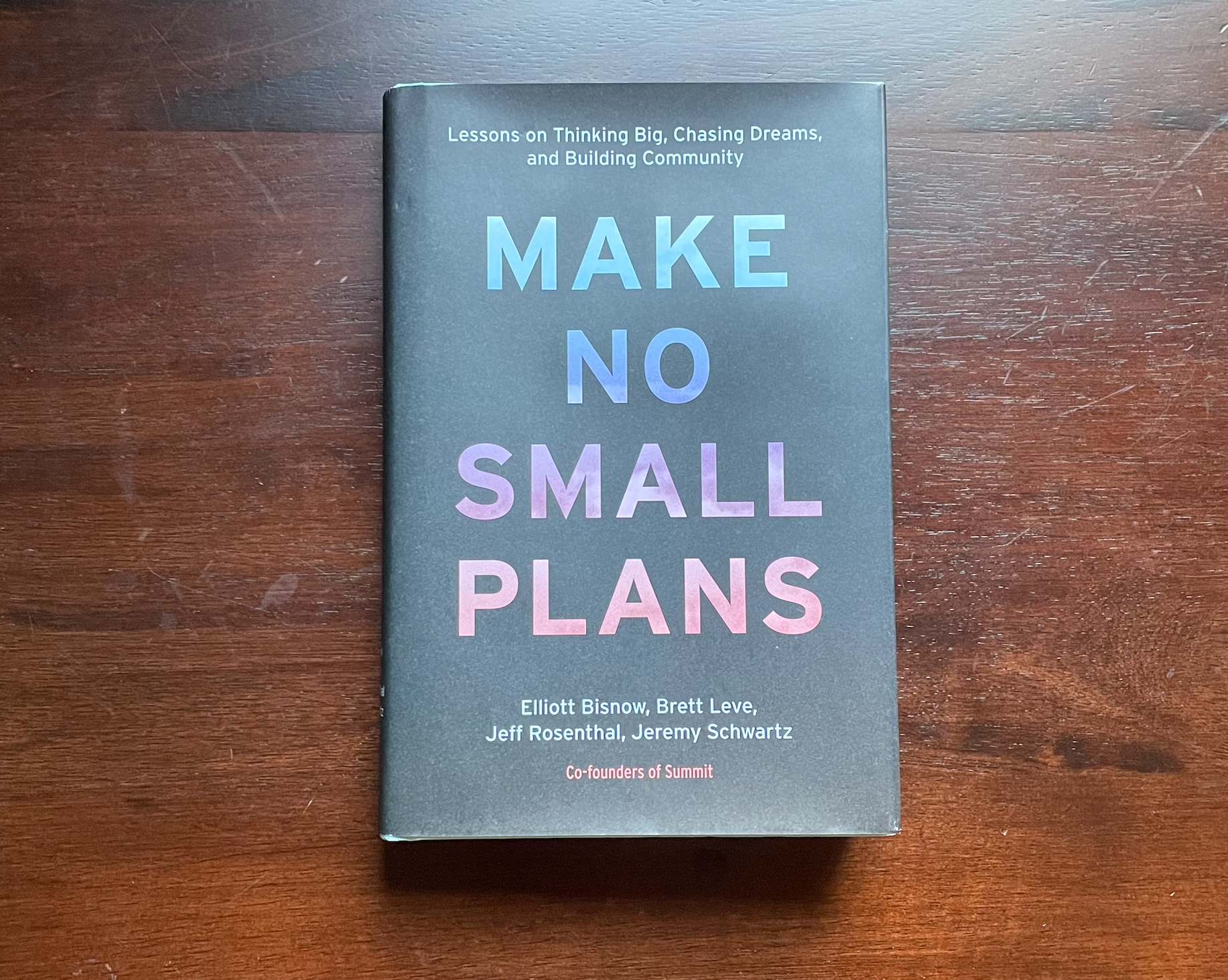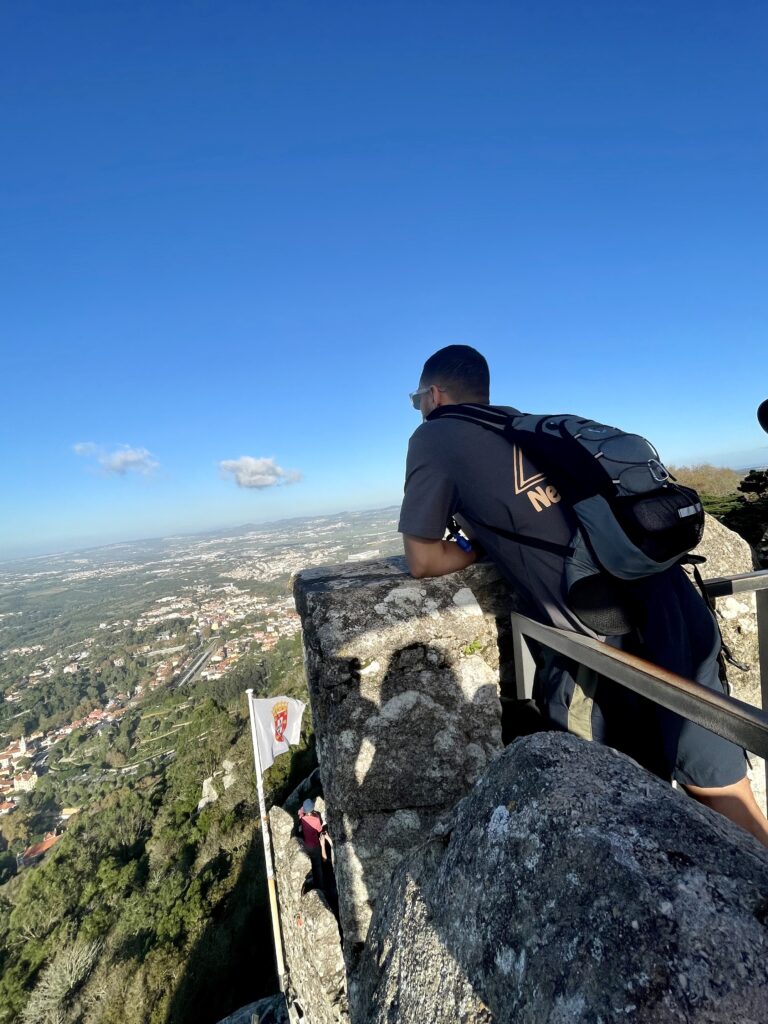Make No Small Plans: Lessons on Thinking Big, Chasing Dreams, and Building Community is one of those page-turning books that should be required reading for all high-school students.
In this post, I’ll review Make No Small Plans, drawing from some of the major insights I walked away with and how the book has helped me think about the power of thinking bigger.
A Brief Synopsis of Make No Small Plans
Make No Small Plans is a book by Elliot Bison, Brett Lee, Jeff Rosenthal, and Jeremy Schwartz, the founders of Summit. In short, Summit is an events and community-gathering organization, whereby everyone from athletes to entrepreneurs to chefs gather together to share ideas, build meaningful connections, and learn from one another.
The book itself is about the story of how the organization was founded. The authors begin from the very early days when each founder was doing something different and recount how they all met each other and eventually went on to found one of the most epic and unique businesses out there.
Readers will understand how a dream that seemed completely unattainable and unrealistic was shaped into something monumental. In addition to the power of thinking big and taking action to achieve your dreams, the book also focuses on the transformational impact of building community.
The Imperative of Thinking Big
“If there’s one bedrock conviction underlying everything we do, it’s that the world needs more big thinking—and needs it right now. It needs more seekers, dreamers, risk-takers, and doers.”
Make No Small Plans (p. 7)
The quote above says it all. It’s precisely the energy that the authors make come alive in Make No Small Plans.
This is exactly why I’m suggesting that this book is required reading for high school students. Too often, and the authors do a great job of reminding us, we think very narrowly. And it’s not because there’s anything wrong with us.
Rather, for most of us, our big—seemingly outlandish ideas—are constantly disregarded. We’re told to “slow down a bit” or asked whether we think whatever we’re proposing is actually realistic.
Though they were fortunate enough to meet some people who would encourage them along the way, they came across their fair share of folks who questioned their big ideas. Still, they prevailed and kept going.
A great example of this comes early in the book when the company was just getting started. Elliot had a vision to gather some of the most influential entrepreneurs together for a weekend of engaging conversations and networking. Mostly all of the people Elliot initially invited said no way. They didn’t think he could gather anyone they might want to spend significant time.
Yet, by thinking big to start—Elliot had never done anything like this before—and sheer persistence, he was able to successfully plan an event that people enjoyed and found valuable.
The authors share story after story to show readers the power of thinking big. From chartering a cruise for over 1,000 people to owning a picturesque ski resort, their stories motivate readers to think limitless.
Putting Yourself in Situations to Succeed
We all know that networking plays a huge role in how successful we are at most things. But, the reality is, for many of us it can be difficult to put ourselves out there to complete strangers.
Though the authors don’t offer readers explicit instruction regarding networking, they make it clear that if it wasn’t for intentionally putting themselves in certain environments and going the extra mile to speak and learn from others, they would not be nearly as successful as they have become.
“You never know where a relationship may lead’ it often bears fruit”
— Make No Small Plans (2022, p. 144)
Time and again, by cold-calling people or randomly walking up to someone at an event, the authors were able to get an idea that positively affected their business. Meeting the founders of Warby Parker and subsequently becoming early investors in the company is one clear example.
This was an important for me to read. I know unequivocally that often it’s not what you know but who you know. Yet I sometimes still struggle with building those connections which can have a lasting impact on my life.
This is another reason why their events are so important. The founders and their team make it so people at their events can enjoy themselves in the company of other folks wanting to learn. Which makes it easier to strike up that random conversation.
Thoughts on the Read
“The world is too big for small plans. So make yours accordingly”
Make No Small Plans (p. 7)
Make No Small Plans is a highly-engaging read. The book’s short chapters, captivating storytelling, and clear writing make it super accessible to a wide range of audiences.
I think the book’s accessibility is what makes it stand apart from others. You can give this book to anyone—even folks who don’t enjoy reading—and they’ll likely find value and enjoy it.
The author’s also do a fantastic job at describing the trajectory of Summit. They write in detail about the things they struggled with at various points, touching on things they learned and imparting lessons along the way. It’s the subtly of the lessons which make them more resonant. It’s not a how-to guide in any way. Rather it’s a success story that we can all learn from.
For all of these reasons, I highly recommend Make No Small Plans to everyone from high school and college students to people well into adulthood who might be considering starting a business.







